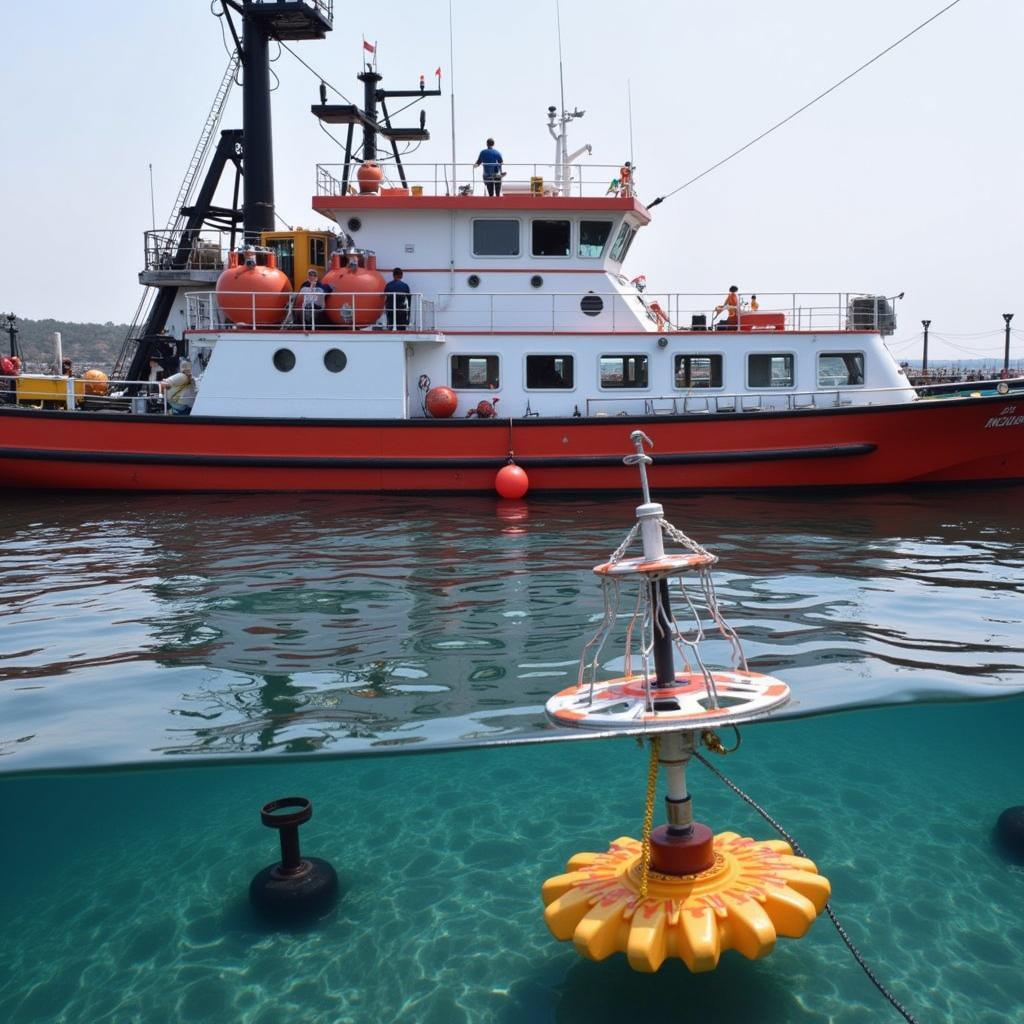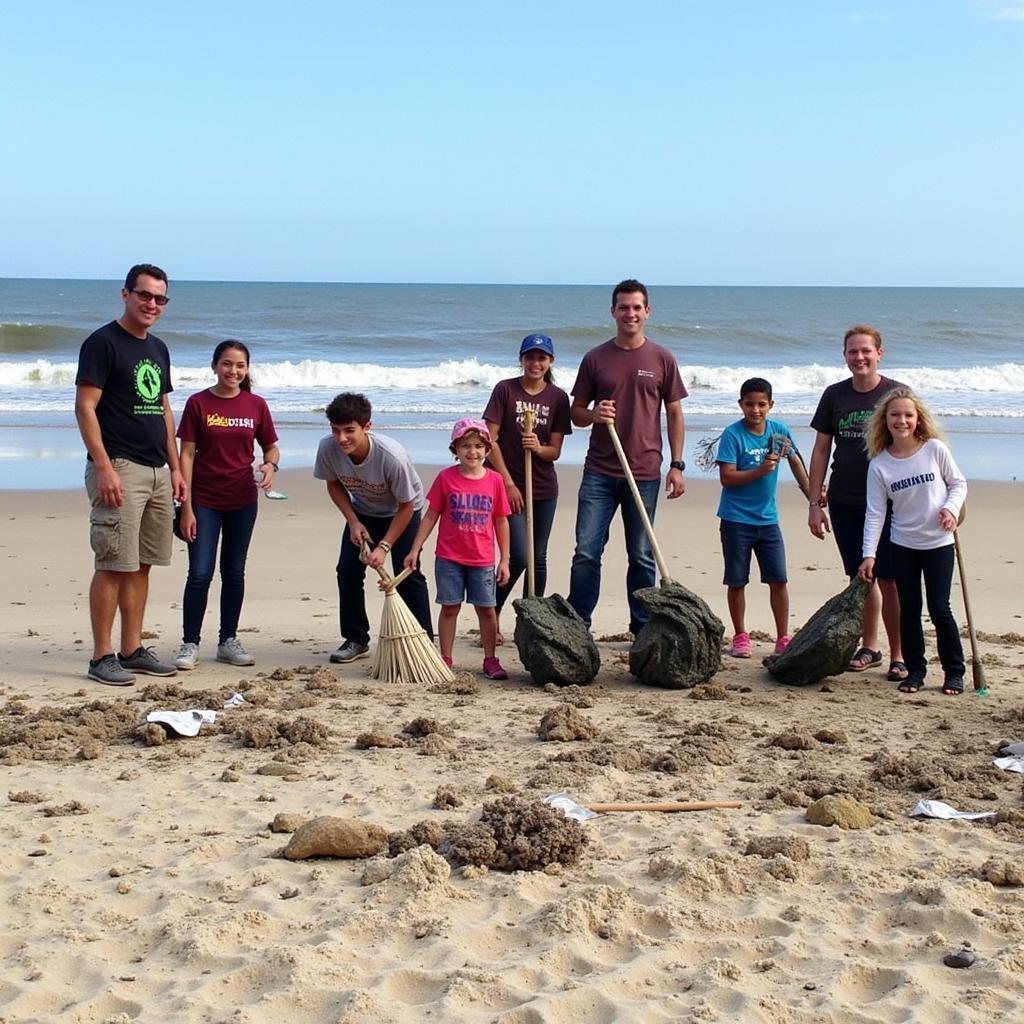The Southern California Coastal Water Research Project (SCCWRP) plays a pivotal role in understanding and protecting the delicate ecosystems of Southern California’s coastal waters. For over 50 years, SCCWRP has been a leading force in environmental research, providing scientific data and guidance that informs policy decisions and helps safeguard the health of our oceans.
Delving into the Depths: What is the Southern California Coastal Water Research Project?
Established in 1969, SCCWRP is a public agency formed through a unique collaboration between the State of California and various stakeholders, including wastewater agencies and sanitation districts. This partnership highlights the shared commitment to protecting our coastal environment. SCCWRP’s mission is to develop and conduct scientific research that addresses critical issues impacting Southern California’s coastal waters.
 Research vessel conducting oceanographic surveys
Research vessel conducting oceanographic surveys
From Mountains to Sea: The Scope of SCCWRP’s Research
SCCWRP’s research encompasses a wide range of topics related to the coastal marine environment. Some of their key areas of focus include:
- Water Quality Monitoring: SCCWRP conducts extensive monitoring programs to assess the health of coastal waters, including beaches, harbors, and estuaries. They track pollutants, monitor bacteria levels, and assess the overall ecological integrity of these vital ecosystems.
- Watershed Management: Recognizing the interconnectedness of land and sea, SCCWRP investigates the impacts of land-based activities on coastal water quality. Their research helps develop best management practices to reduce pollution from stormwater runoff, agriculture, and urban development.
- Climate Change Impacts: As the realities of climate change become increasingly apparent, SCCWRP is actively studying its potential effects on Southern California’s coastal waters. This includes investigating sea-level rise, ocean acidification, and changes in marine species distribution.
 Laboratory analysis of water samples for pollutants
Laboratory analysis of water samples for pollutants
The Power of Collaboration: SCCWRP’s Partnerships
SCCWRP firmly believes in the power of collaboration. They work closely with a diverse network of partners, including:
- Government Agencies: SCCWRP collaborates with federal and state agencies, such as the Environmental Protection Agency (EPA) and the California Ocean Protection Council, to ensure their research aligns with regulatory needs and policy priorities.
- Academic Institutions: SCCWRP maintains strong partnerships with leading universities and research institutions, fostering scientific innovation and providing valuable training opportunities for future generations of environmental scientists.
- Community Organizations: Engaging with local communities is paramount to SCCWRP’s work. They collaborate with community groups and stakeholders to address local environmental concerns and raise awareness about the importance of protecting our coastal resources.
The Future of Our Coast: How SCCWRP’s Work Makes a Difference
The research conducted by SCCWRP has a direct and tangible impact on the health of Southern California’s coastal waters. Their findings provide the scientific foundation for:
- Developing effective water quality regulations and pollution control measures
- Guiding coastal management decisions, such as marine protected area designations
- Informing climate change adaptation strategies to mitigate impacts on coastal ecosystems
 Volunteers participate in a coastal cleanup event
Volunteers participate in a coastal cleanup event
Looking Ahead: SCCWRP’s Continued Commitment to Coastal Protection
As we move forward, the work of SCCWRP becomes even more critical. The challenges facing our oceans are complex and multifaceted, requiring innovative research and collaborative solutions. SCCWRP remains dedicated to providing the scientific insights needed to protect and preserve Southern California’s coastal waters for generations to come.
Frequently Asked Questions about the Southern California Coastal Water Research Project
1. How is SCCWRP funded?
SCCWRP receives funding from a combination of sources, including state and federal grants, contracts with partner agencies, and contributions from its member agencies.
2. Does SCCWRP conduct research beyond Southern California?
While SCCWRP’s primary focus is on Southern California’s coastal waters, their expertise and research findings often have broader implications and are shared with the wider scientific community.
3. Can the public access SCCWRP’s research and data?
Yes, SCCWRP is committed to transparency and making its research accessible. They have a comprehensive website with publications, reports, and data available for public download.
4. How can I get involved with SCCWRP’s work?
SCCWRP offers various opportunities for public involvement, including volunteer opportunities, citizen science projects, and educational outreach programs.
5. What are some of the biggest threats to Southern California’s coastal waters?
Some of the most pressing threats include pollution from urban runoff, climate change impacts such as sea-level rise and ocean acidification, and the introduction of invasive species.
Need help?
For further assistance, please contact us at:
Phone Number: 0904826292
Email: research@gmail.com
Or visit us at:
No. 31, Alley 142/7, P. Phú Viên, Bồ Đề, Long Biên, Hà Nội, Việt Nam.
Our customer service team is available 24/7 to assist you.